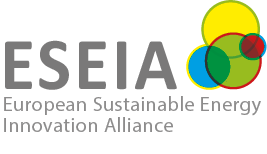ESEIA WORKING GROUPS
Working Groups
Focus Groups
Experts
Active Members
The ESEIA Working Groups and Focus Groups are the key drivers of the Association. The Working Groups include approximately 350+ active experts from all fields of the energy system. Their actions focus on agenda-setting and project generation activities under Horizon Europe.
Three thematic Working Groups
Working Group Biorefineries, Biobased Economy and Bioresource Utilization
Working Group coordinator: Michael Bongards, TH Cologne, DE
In this thematic area, the aim is threefold, namely:
- to create novel bio-refinery value chains and develop new bio-based industrial products;
- to provide a framework to contextualized and rational use of bio-resources focusing on the role of bioenergy systems innovation and bio-economy in the energy transition;
- and thirdly, to explore usage scenarios for bio-based fuels and bio-wastes.
The Working Group integrates three Focus Groups:
FG 1: Biorefineries and Biobased Industrial Products led by W. Bauer, TU Graz, AT and L. Duarte, LNEG, PT creates novel biorefinery value chains and develop new biobased industrial products.
FG 2: Bioeconomy and Circular Economy led by M. Bongards, TH Cologne, DE provides a framework to contextualized and rational use of bioresources focusing on the role of bioenergy systems innovation and bioeconomy in the energy transition.
FG 3: Bioenergy use of Biobased Fuels and Biowastes led by M. Huhtinen, Savonia UAS, FI explores usage scenarios for biobased fuels and biowastes to create sustainable solutions.
Working Group Energy Transition in Urban Regions
Working Group Coordinator: Goran Krajačić, Uni Zagreb – FSB, HR
Since most people live or work in agglomerations, ESEIA is concerned with energy transition in cities and their hinterland. The sustainable energy transition requires the active participation of European citizens for radically new ways of how we organize sustainable climate-friendly living in modern society. We need to reorganize the business, the world of work, how we educate people, how we move from A to B, how we build our homes, how energy gets produced, stored, converged, and transmitted, and how we save, use and reuse our resources using the digital revolution to our advantage.
The Working Group integrates four Focus Groups:
FG 1: Smart Mobility led by M. Hirz, TU Graz, AT focuses on the integration of new mobility concepts into urban regions to enable the transition to sustainable transportation for both people and goods. This includes alternative propulsion systems, automated driving functions and the integration of new vehicle concepts and business models.
FG 2: Smart Grids led by Robert Schürhuber, TU Graz, AT discusses the combination of energy generation and efficiency technologies in urban regions and on a supra-regional scale.
FG 3: Smart Energy Efficiency Buildings led by G. Stauskis, VILNIUS TECH, LT researches new ways to match the future social and environmental needs of the built environment in urban regions.
FG 4: Advanced Computing for Energy Transition led by G. Papa, JSI, SI uses Artificial Intelligence to analyse consumer data for innovative energy solutions. Artificial Intelligence has become a big field with many challenges ahead. One of them is Machine Learning to optimize the energy supply and demand where power is created or consumed.
Working Group Smart Energy Materials
Working Group Coordinator: Tina Zuzek, JSI, SI
In a world in which resources become more and more scarce, the design and use of new energy materials need to observe our global sustainability goals. The Working Group addresses the synthesis, processing and application of smart energy materials to be used for improving the energy efficiency of renewable energy systems.
This Working Group addresses the synthesis, processing and application of smart energy materials to be used for improving the energy efficiency of renewable energy systems. The transition in energy production requires a new emphasis on research for more stable, low-power and distributed energy sources that are inexpensive, highly reliable, require no upkeep, and may not depend upon connection to electrical grids.
Three dimensions in this Working Group includes materials for energy harvesting systems, materials for energy storage, and energy materials for automotive applications. Within energy harvesting materials, an important part is dedicated to the use of thermoelectric and magnetic materials that will allow for a more efficient and smaller energy harvesting systems able to convert complex hybrid energy sources and reduce consumption of materials and energy. Advanced energy storage technologies, both electric energy storage and thermal energy storage, will be taken into account. Another focus will be put on lightweight materials and high-performance materials, especially regarding their applications in the automotive field.
Two horizontal Working Groups
cooperate with the thematic groups.
Working Group Governance, Business Models and Legal Frameworks
Working Group Coordinator: Frans Coenen, UTwente, NL
This Working Group focuses on the radical shifts that energy transition brings about in governance, social and business models, and related regulatory and legal regimes. To foster the transition, the functioning of multi-actor networks, multi-level relations and energy ecosystems needs to be improved. Institutional barriers need to be overcome and opportunities and incentives created. The interaction between all stakeholders on EU, national, and subnational levels as well as between energy actors of and in public jurisdictions, competitive markets and civil society needs to be explored. Specific topics of interest are also the promotion of renewable and citizen energy communities, prosumerism, energy democratization, and energy market regulation including industrial standards and energy certification, energy business strategies and ecosystems, energy internet platforms, and entry-barriers, as well as smart experimental energy regimes.
Working Group Education and Training
Working Group Coordinator: Fabio Montagnino, CYI, CY
The Working Group fosters capacity-building of people and institutions in Europe and abroad. It conceives and implements cooperative training courses under the ESEIA Education and Training Programme (ETP). The cooperative training formats, namely international summer schools (ISS), interdisciplinary student camps (ISC), and pilot plant courses (PPC), benefits students, young scientists and professionals already active in the field by linking practice and education. They are implemented in cooperation with the ESEIA industrial partners and hosted by ESEIA members. In addition, ESEIA organizes staff exchange among members.
The ETP was designed to build on the following gaps highlighted in the EC SET-Plan Education and Training Initiative:
- more practice-oriented training;
- more business – education – reserach interaction (knowledge based triangle), i.e. need to have industry involved in course design form the outset;
- systems integration, i.e. joined-up thinking of a system to enable whole integration including design, implementation, maintenacne performance and post-occupancy evaluation;
- cross-cutting courses which deal with the entire value chain.






